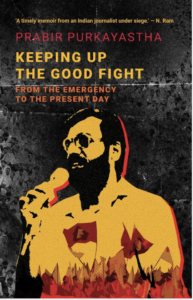By Geeta Seshu
From Kashmir to Kanyakumari ! Restrictions on the media literally seem to span the entire country as jittery security forces and police crack down on the movements of foreign journalists. In two separate incidents over the last 12 months, French journalists came under the radar of India’s security forces and police. While their action gets mired in hair-splitting on rules and regulations, the stories they came to do remain untold.

On Nov 29, two Tamil journalists – Ananth Kumar and Sriram – were detained and faced interrogation by Kanyakumari police after two French journalists visited a prohibited area in a unit of the Indian Rare Earths Ltd (IREL) in Manavalakurichi. The two Indian journalists had accompanied the French as translators. They were released only later in the day after their colleagues protested the detention and said they were not present during the visit, much less were they aware of it.
Last December, journalist and documentary film-maker Paul Comiti was arrested in Srinagar on December 9 last year. He had come to India on a business visa and had only gone to Srinagar to explore locations for a film he planned to shoot. However, he was arrested and deported.
While it is as yet unclear what story the two French journalists were working on, unconfirmed reports have it that they were in India to document stories of illegal sand mining and attacks on journalists. In any case, the IREL unit in Manavalakurichi is a high security area. IREL, is a public sector endeavor of the Department of Atomic Energy (DAE), is engaged in the mining and processing of mineral sands containing titanium, zirconium, thorium, and other elements. It deals with mining of the rich mineral deposts in the Kanyakumari coastal area, including rare and atomic minerals. The Manavalakurichi Plant supplies chemically treated zircon for nuclear fuel. In March this year, IREL secured environmental clearance for two projects to mine beach sand minerals such as illmenite, rutile, zircon, monozite, sileminite and garnet.
DSP Bhaskaran told the FreeSpeechCollective that, in Kanyakumari, the two French journalists – Arthur Roland Rene and Jules Damlen, had left the country a day earlier. Police detained Kumar and Sriram for questioning only as they needed to determine whether the two had helped the French journalists to access the prohibited area, Mr Bhaskaran said.
Bhaskaran said that Kanyakumari police have lodged a case against the two French journalists for trespassing and violating visa restrictions,. “The two french nationals had come to India on tourist visa, and the two local journalists assisted them when they moved around a restricted area. We came to know that Anand Kumar booked their rooms. They were shooting for a documentary film,” he added.
According to reports, police have booked them under Section 447 (punishment for criminal trespass) of the Indian Penal Code read with sections 14(A) (penalty for entry in restricted areas, etc.), 14(B) (penalty for using forged passport) and 14(C) (penalty for abetment) of the Foreigners Act 1946.
However, Kumar and Sriram told police they had no clue what ‘news’ the French journalists were after and that their tourist visa prohibited them from doing any journalistic work. They were in fact, fast asleep in their lodge when the two French journalists contacted a local parish priest who they had established contact with and gone to the IREL unit.
The police let both off later in the day but have asked them to return for further interrogation, if necessary.
Foreign media in India
Police investigations on the visa violations by the french journalists notwithstanding, the entire fracas has shone the spotlight on the very tenuous situation of foreign journalists in India. Over the last few years, several attempts by foreign media to enter India and do stories have been thwarted.
An International Federation of Journalists (IFJ) statement listed a few recent instances:
- On February 6, Amruta Slee, an Indian-Australian journalist and her colleagues were denied journalist visas to India. Slee, a radio producer for Radio National, a program on ABC, was neither officially denied nor given a visa to travel to India but asked for her list of her potential interviewees in India. In 2017, the ABC published an investigative report on the controversial Carmichael coal mine project in Queensland, Australia, funded by the Adani Group, an Indian multinational conglomerate head quartered in Ahmedabad, Gujarat.
- On December 10, 2016, police in Jammu and Kashmir detained French freelance journalist Edward Paul Comiti for ‘violating visa regulations’.
- On December 19, 2016, Mukunda Raj Kattel, a director of the Asian Forum for Human Rights and Development (FORUM-ASIA) was denied entry in India and was deported a day later.
- In July, 2016, three India-based journalists of the Chinese state news agency, Xinhua, were denied visa extension.
Apart from this list, here are other instances :
- In 2013, two German journalists who attempted to cover the Koodankulam agitation were denied entry into Idinthakkarai village in Tamil Nadu
- In 2011, renowned radio journalist David Barsamian was deported for attempting to travel to Kashmir
And this report has listed more instances of journalists, researchers and and activists who were denied entry into India.
All in all, we need to ask ourselves: do we have something to hide?
See also, statement by Alliance for Media Freedom on the detention of the two journalists and the campaign by the BJP to label them as abetting ‘spies’ .



1 thought on “From Kashmir to Kanyakumari !”